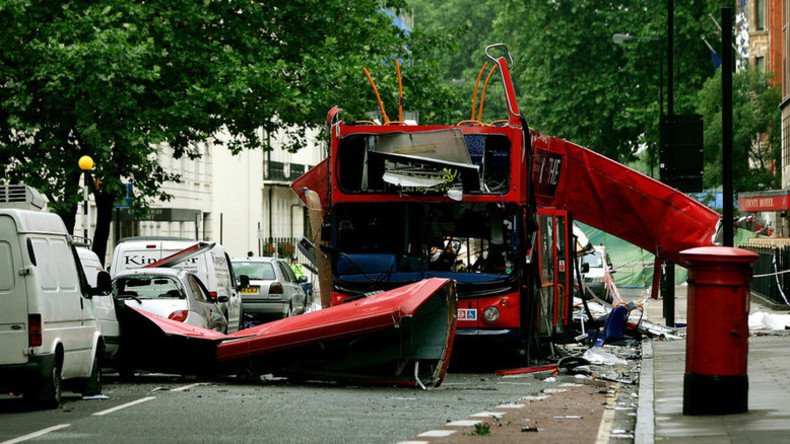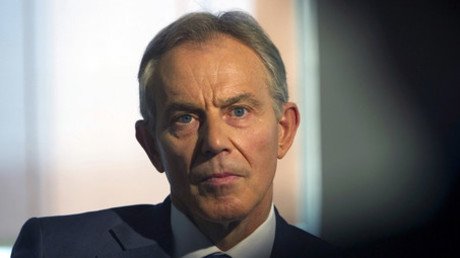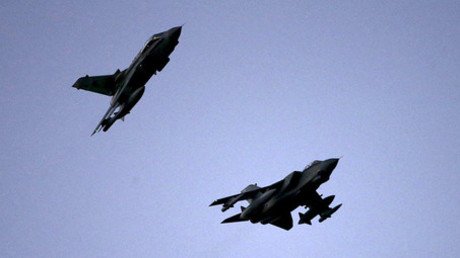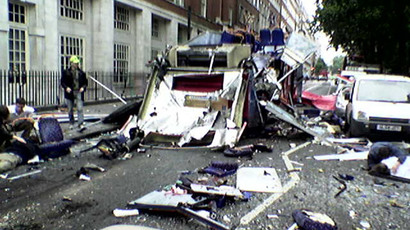‘More armed police won’t make London safer’: 7/7 detective speaks to RT

David Videcette, a former Scotland Yard counter-terror detective who investigated the 7/7 attacks on London transport in 2005, doesn’t believe arming more police will make the capital any safer, as Britain’s war with Islamic State escalates.
“At any one time in London there are several hundred armed police officers already on duty,” Videcette told RT.
“All the DPG are armed. All the ARVs are armed. And you will have other police officers on duty who have access to firearms if required. On top of that we have army barracks across London full of weapons. It is ridiculous to suggest that we need more.”
In the wake of the Paris atrocities, there have been fears that a similar attack could take place on the streets of London. Prime Minister David Cameron has given the police clearance to shoot suspected terrorist on sight, instead of attempting to negotiate.
However, Videcette thinks adding more armed police to the equation will only serve to make Britain more hostile and divisive.
“I don’t think more armed police are the answer – if a suicide bomber is going to blow himself or herself up or shoot into a crowd – they are going to do it whether a police officer has a gun or not. And they will be taken out by the existing fire power we already have available. We don’t need an armed officer on every street corner. These terrorists are a tiny number of people.”
Arming more police will make officers “less approachable” and “more distant,” hampering appeals for witnesses to come forward.
The fear of a terror attack inspired or conducted by Islamic State (IS, formerly ISIS/ISIL) has risen further in recent days. On Wednesday evening, MPs voted overwhelmingly in favor of extending RAF airstrikes against the terror group from Iraq into Syria, amid warnings the move could make British citizens a target.
On Friday, a terror expert told CNN that Britain is Islamic State’s next target, saying European authorities had received “specific intelligence” that extremists living in the country could carry out an attack within weeks.
The remarks echo comments from Labour leader Jeremy Corbyn, who said extending the aerial bombing campaign would make Britain a more dangerous place to live. However, some 66 rebellious Labour MPs voted in favor of the motion to extend airstrikes, swinging the balance in Cameron’s favor.
Corbyn agreed with former Mayor of London and co-convener of Labour’s defense review Ken Livingstone, who has blamed the 7/7 attacks on Tony Blair and his 2003 invasion of Iraq.
However, Videcette calls Livingstone’s allegations “ridiculous and grotesque.” The mastermind behind the attacks was radicalized long before 2003, he argues. Livingstone’s perspective only serves to alienate vast sections of British society.
“The lead bomber in the 7/7 attack was a radicalized Muslim with killer tendencies long before the 2003 invasion of Iraq. He was visiting terror training camps back in the 1990s,” said Videcette.
“The reasons he gives in his video statement are lies and a crude, shoddy attempt to justify his disgusting behavior using religion.
“Put another way, we wouldn’t base the advice we give our daughters on the views of [serial killer] Fred West would we? So why base our defense policy on the back of what a mass murderer said in a video before he blew himself up.”
The motion to extend airstrikes into Syria was welcomed by former Prime Minister Tony Blair, who said bombing the country is the first step to defeating the terrorist group, which controls large swathes of Iraq and Syria.
The first bombing raids, carried out by RAF Tornado jets early on Thursday morning, targeted IS held oilfields in the east of the country, and were deemed a “success” by the Ministry of Defence.
Cameron insisted airstrikes will “make Britain safer,” but Videcette says the “simple” act of bombing would not in itself make the UK safer place.
He argues that in order to completely eradicate IS, more needs to be done to target the group’s finances.
“What started off as a localized issue involving armed militia has gradually mushroomed into a regional conflict that is now affecting Europe. ISIL have access to a huge amount of money because they are selling oil taken from Syria and Iraq. Their ability to convert this oil with regional partners into funds and weapons is now threatening not just their region, but beyond too.”
The spread of the terror group has created the “worst humanitarian crisis since the Second World War,” he adds.
However, critical as he is of airstrikes and boosts to armed policing, Videcette is quick to defend the new Investigatory Powers Bill (IPB), which is expected to give police and spy agencies the power to intercept more electronic communications than ever before.
The bill was initially introduced in 2012 as the Communications Data Bill, and was quickly dubbed the ‘snoopers charter’ for all the extra surveillance powers it included.
It was conceived in the wake of the Edward Snowden leaks, which revealed America’s NSA and Britain’s GCHQ had been involved in the mass illegal surveillance of citizens’ data, including telephone calls, text messages and emails.
Videcette says the IPB is simply putting existing practice into a transparent legal framework.
“It’s unfair to call it the snoopers charter. It’s called the Investigatory Powers Bill and will put a legal framework into law for the things that the police and security services have been doing for some years.”
“The Home Office is attempting to lead the way globally by making this stuff more transparent. Most countries collect this data – but do it behind closed doors. The technology and the way we communicate is evolving so fast, that often laws cannot keep pace with it.”
“Our police and security services are the best in the world and they simply do not do things unless there is an absolute necessity to do so.”
However, he concedes that the “cancerous nature of extremists and fundamentalists won’t be solved by arresting people and increasing our capacity to spy on people.”
He believes the only way to truly eradicate the threat of Islamic extremism in the UK is to build bridges with marginalized Muslim communities who have been ostracized by a combination of radical preaching an increasing social division.
“The problems lies with those particularly isolated and extremist Muslim communities that are cut off by religious zealots who are able to preach their distorted view of the world and attract at risk, disaffected individuals looking for a cause. Greater integration into UK society is the answer.”
David Videcette was a Scotland Yard detective with the Anti-Terrorist Branch at the time of the London 7/7 bombings. He is a terrorism and organized crime expert and author of The Theseus Paradox, dedicated to the Police Dependants’ Trust.















